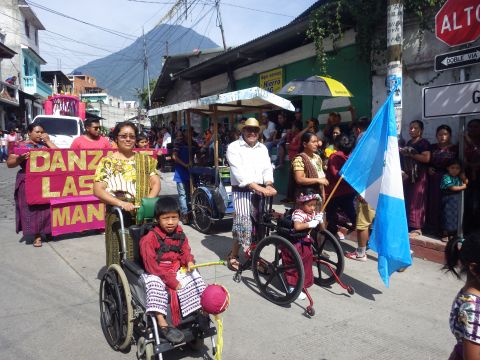
My work at Adisa has made me think more deeply about the meaning of inclusion. Adisa's motto: "Por una comunidad inclusiva" (for an inclusive community) is much more than just a slogan. It is the motivation and foundation for our work. Whether it be our healthcare, employment, education, or empowerment programs, or just daily interactions, Adisa strives to create a community based in inclusivity.
Inclusion starts by changing the culture around disability. Education, mobility solutions, health services, and physical therapy do not bring change without being backed up by a supportive community. In Santiago Atitlán, it has been a long and difficult process to change public perception but, as Adisa celebrates its 20 year anniversary this year, we are happy to see changes within the community.
The first time children with disability participated in the independence day parade in Guatemala in 2001, it went poorly. They were insulted, and made fun of, and Adisa nearly pulled them out of the parade because of it. But in the end, they stuck it out because otherwise, they would never learn to go out on their own. Fast forward to 2017, and children from Atitlan's school of special education lead the parade. They smiled and proudly wave flags, cheered on and admired by the same community that nearly forced them out sixteen years earlier.
Changing community attitude has made the rest of Adisa's programs possible. In education, inclusive education training for school teachers provide local teachers the skills and knowledge necessary to include people with disability in their classrooms.
In healthcare, our early intervention program provides specialized care to young children children with developmental delays. Engaging and stimulating children at an early age is critical to their growth. Children in this program have rapidly improved their speech, motor, and social skills.
In employment, Artesanos de Adisa is a force of 18 young men and women with disabilities from Santiago Atitlán that make artesanal crafts out of recycled materials. What started out as a small project to provide work for people with disabilities in 2006, has now become its own association and today is selling its products throughout Guatemala and internationally. In addition to artesanal crafts, young people with disabilities also run a chicken coop that sells eggs to many people in Santiago Atitlán. Every person, regardless of (dis)ability, has the right to their own livelihood.
In my own work in development, an important aspect of my job is fundraising. One project that we recently fundraised was to build a wheelchair accessible ramp for Juanito. With the support of many generous donors, we were able to raise the funds and Juanito can now get to school and leave his house on his own, without relying on his dad or brother to carry him up the steep staircase. Accessibility projects such as this one empower people with disabilities to gain their independence and improve their quality of life.
Beyond the empowerment of individuals, we also work with and train other disability service organizations to adopt community based rehabilitation strategies. Adisa is a leading organization, reference and model in disability work that promotes inclusive development and advocacy. We want our work to be sustainable, and by training with other organizations, we ensure the longevity of our work.
